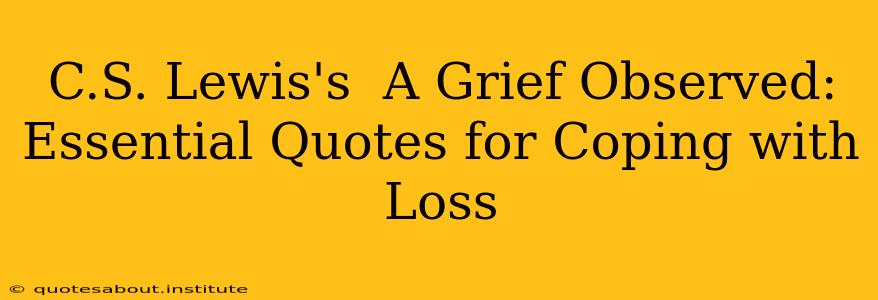C.S. Lewis's A Grief Observed isn't your typical self-help book; it's a raw, honest, and deeply personal account of his grief following the death of his wife, Joy Davidman. Published in 1961, this unflinching exploration of sorrow continues to resonate with readers grappling with loss decades later. While not a prescriptive guide, the book offers profound insights and solace through its unflinching honesty and profound reflections on faith, doubt, and the enduring power of love in the face of death. This article will delve into some essential quotes from A Grief Observed and explore how they can help us navigate our own experiences of loss.
What Makes A Grief Observed So Powerful?
Unlike many bereavement guides that offer structured advice, A Grief Observed presents a brutally honest portrayal of Lewis's emotional journey. He doesn't shy away from the anger, despair, and confusion that accompany grief. This raw vulnerability makes the book profoundly relatable and comforting to those experiencing similar struggles. The book's power lies in its ability to validate the messy, unpredictable nature of mourning, reminding readers that it's okay to feel whatever they feel, even if those feelings are contradictory or seemingly unbearable.
Essential Quotes and Their Meaning
Many passages in A Grief Observed offer profound insights into the grieving process. Here are some essential quotes and their significance:
"No one ever told me that grief felt so like fear."
This quote captures the unsettling and often unexpected nature of grief. The familiar comforts of life are disrupted, leaving a sense of vulnerability and uncertainty. The fear isn't necessarily of death itself, but of the unknown future, the loss of a loved one's presence, and the daunting task of rebuilding one's life.
"What seems to me the most significant thing about grief is that it changes. The immediate reaction to it is fear, or rather a curious mixture of fear and relief. Then the fear becomes anguish—a sense of being emptied, deprived, and helpless. At the same time, however, this anguish is quite different from despair. It contains an element of hope and expectation. This passes in its turn."
This quote highlights the evolving nature of grief—a process characterized by distinct phases and emotional shifts. It acknowledges the initial shock, the subsequent anguish, and the eventual, though perhaps gradual, emergence of hope. Understanding that grief is not a monolithic experience, but rather a dynamic journey, can be incredibly empowering.
"She is not here. She has not left me. She is still alive. The three statements cannot be reconciled in my mind, yet all three are true."
This powerful statement reflects the paradoxical nature of grief. The physical absence of a loved one is undeniable, yet their memory, their influence, and the love shared endure. This quote beautifully captures the cognitive dissonance many mourners experience, attempting to reconcile the reality of death with the enduring power of love and memory.
"The only people who actually behave as if they had any sense of the meaning of life are the people who are deeply bereaved."
This poignant observation suggests that profound loss can unexpectedly foster a deeper appreciation for life's fragility and preciousness. Facing the ultimate loss often forces a reevaluation of priorities, leading to a more profound understanding of life's meaning and the importance of cherishing each moment.
How A Grief Observed Helps in Coping with Loss
A Grief Observed doesn't offer easy answers or simple solutions. Its value lies in its ability to:
- Validate feelings: The book normalizes the complex and often contradictory emotions associated with grief.
- Provide companionship: Readers find solace in Lewis's honest portrayal of his struggles, feeling less alone in their own pain.
- Offer perspective: Lewis's reflections on faith and the afterlife provide a framework for understanding loss within a broader context.
- Inspire hope: While acknowledging the intensity of grief, the book ultimately suggests the possibility of healing and finding meaning amidst sorrow.
Beyond the Quotes: Understanding the Broader Context
The strength of A Grief Observed lies not just in individual quotes but in the overall narrative. It is a journey of faith, doubt, and the ongoing process of acceptance. Lewis’s willingness to share his vulnerabilities makes the book incredibly powerful and relatable for those experiencing loss. It's a reminder that grief is a deeply personal experience, a journey with no prescribed timeline or "correct" way to feel. The book simply validates the experience, offering solace in its honesty and profound reflections on life, death, and the enduring power of love.

